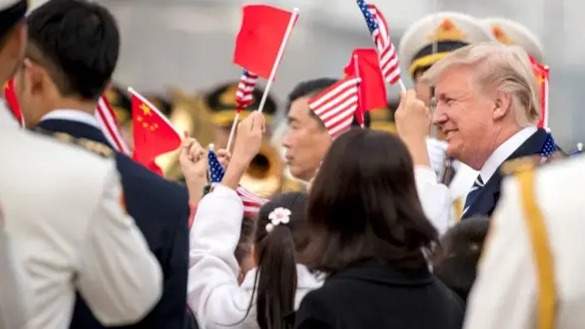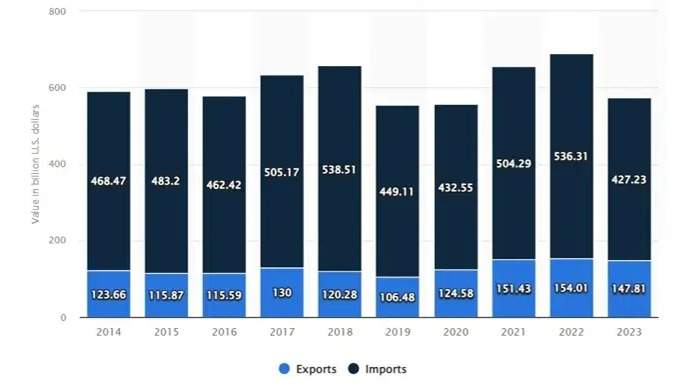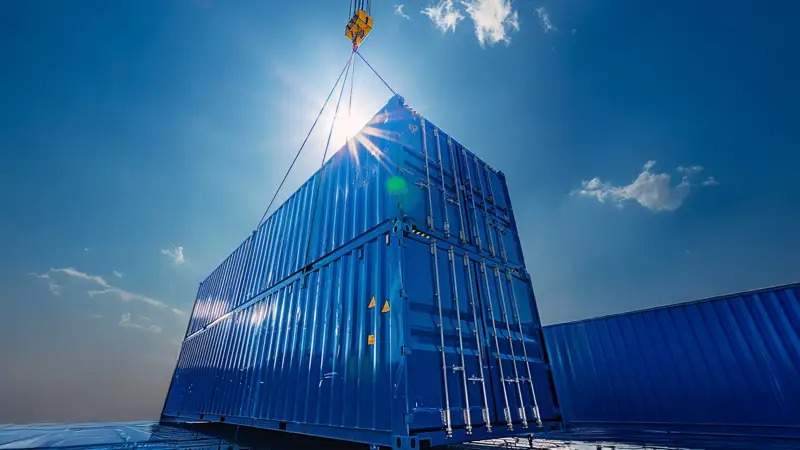"Mongolia is fascinating. These are incredible, wow!" - Camilo Morales, Akin Gump LLC
The Eurasia Center's China Blog
Ralph Winnie Jr. with the Mongolian President

Blog Archive
Monday, March 31, 2025
Ralph Winnie, EC/EBC's VP Global Business Development meets with the President Elbegdorj of Mongolia in Washington, DC.
Thursday, October 10, 2024
Thursday, September 19, 2024
Ralph Winnie Jr. Interviewed by Kazinform: How U.S.-China relationship will transform under the new American president 9/19/2024
How U.S.-China relationship will transform under the new American president – expert
The debates proved that regardless of which of the US presidential candidates comes to power, the US-China trade confrontation will continue, Kazinform News Agency correspondent reports.
In particular, Kamala Harris noted that Donald Trump showed weakness in relations with China, which indicates her intention to continue the policy of the Biden administration, which not only maintained the sanctions imposed by Donald Trump, but also increased their number against China.
Policy of the Trump and Biden administrations towards China
In order to understand the policy the US presidential candidates will pursue towards the Chinese vector, it is necessary to look at their actions during their time in power.
Donald Trump began his presidential term with an anti-Chinese agenda. In December 2016, the first telephone conversation took place between the President of the United States and the President of Taiwan Tsai Ing-wen. This was the first contact between the two leaders since 1979 and a signal for Beijing.
Trump lived up to his promises and started a trade war with China in 2017, which he spearheaded in his election campaign.
In early 2018, the Indo-Pacific National Security Strategy was approved marking the start of Donald Trump's strategy to counter the strengthening of China.
The U.S. Department of Justice has launched the China Initiative to prevent China's clandestine activities in the United States.
It should be noted that President Trump paid more attention to the country's internal problems, and entrusted relations with China to Secretary of State Mike Pompeo.
After many years of customs duties and negotiations, in January 2020, the U.S. President and Chinese Vice Premier Liu He signed the long-awaited Partial Trade Agreement which was supposed to reduce tensions in the Chinese-American trade war. As per the agreement, the United States agreed to halve some additional tariffs on Chinese products in return for Beijing's promises in the field of intellectual property protection and willingness to import $200 billion worth of American goods and services in the fields of industry, agriculture and energy. At the same time, many export tariffs imposed between the two nations during the trade war remained in force and were the subject of further complex negotiations.

It bears to remind that Washington accuses the Chinese authorities of protectionism and unfair business practices, referring to the government subsidies for local enterprises and administrative rules that complicate the work of U.S. firms in China.
In 2020 alone, the Trump administration took at least 210 actions related to China spanning more than 10 departments: starting from indictments and arrests, visa restrictions, blocking imports of goods, export controls, recognition of Huawei and ZTE Corporation as threats to national security, restrictions for Chinese journalists, to sanctions against 90 Chinese legal entities and individuals.
The new US President Joe Biden, coming to power on January 20, 2021, immediately made it clear that he was in no hurry to depart from the policy of the Trump administration.
According to conservative estimates, about 150 Chinese companies and a dozen individuals have been included in the new US blacklists.
A number of laws have been adopted against China: "On Strategic Competition" (April 2021), "On banning all goods from Xinjiang" (July 2021), "On Competition in America" (February 2022) and others. Biden issued executive orders to expand Donald Trump's ban on American investments against 59 Chinese companies (June 2021) and limit U.S. investment in Chinese technology (August 2023).
It is worth pointing out that the United States and China reached an agreement on climate cooperation (November 2023) and the resumption of military negotiations (December 2023) after Beijing discontinued dialogue with Washington through military departments in August 2022 due to the visit of the Speaker of the House of Representatives Nancy Pelosi to Taiwan.
U.S.-China total volume of trade in goods (exports and imports) from 2014 to 2023 (in billion U.S. dollars)

According to statistics, the trade turnover between the United States and China during the Trump administration from 2017 to 2020 led to a decrease in U.S. exports to China (from 130 to 124.6 billion U.S. dollars) and imports (from 505.2 to 432.5 billion U.S. dollars).

A similar situation was observed during the Biden administration from 2021 to 2023, exports (from 151.4 to 147.8 billion U.S. dollars) and imports (from 504.3 to 427.2 billion U.S. dollars) of the United States decreased.
How U.S.-China relationship will transform in the event of Trump or Harris coming to power
Ralph Winnie, Vice President of the Eurasian Center, noted the candidates' different approaches to building relations with China.
According to the expert, Kamala Harris will continue the policy of Joe Biden, which is characterized by a more traditional, diplomatic and multilateral approach towards China.
In particular, the U.S. will continue to pursue the policy of cooperating with American allies and partners in the Indo-Pacific region to develop a unified policy towards Beijing.
“The United States will continue to develop cooperation with China in the field of climate, military contacts, artificial intelligence, and drug control, but will also actively take measures to prevent ‘unfair trade’ from China in order to protect American industry and business,” Ralph Winnie noted.
If the Republican candidate comes to power, Donald Trump will try to reach an agreement with the Chinese side.
“Donald Trump will try to sit down at the negotiating table with China, get concessions from them and conclude another bilateral ‘trade agreement’,” Ralph Winnie added.
Donald Trump is considered an unpredictable politician, unlike his opponent. In addition, China is characterized as a very tough negotiator, which may intensify the trade war between the nations.
The expert notes that both U.S. presidential candidates followed their distinctive political courses earlier within the framework of the Trump and Biden administrations and a sharp change in their views on China is unlikely.

Monday, September 9, 2024
Ralph Winnie Jr. Invited as a guest to The 33rd Anniversary of Independence of the Republic of Uzbekistan on September 9th, 2024
On the occasion of
the 33rd Anniversary of Independence
of the Republic of Uzbekistan
Ambassador Furkat Sidikov
extends his kind request
to join us on
MONDAY | SEPTEMBER 9 at 6.30 PM
Venue: InterContinental the Willard Washington D.C.,
Thursday, September 5, 2024
Ralph Winnie Jr.'s Interview with Kazinform September 5th, 2024
Плюсы АЭС и поддержка бизнеса - американские эксперты высказались о Послании Токаева
Американское экспертное сообщество положительно оценило Послание Президента Республики Казахстан к народу. В то же время, большой интерес специалистов США был проявлен к энергетическому аспекту нашей страны, передает собственный корреспондент агентства Кazinform.
Ведущий аналитик и руководитель международной программы Международного налогового и инвестиционного центра по энергетике, экономическому росту и безопасности Уэсли Александер Хилл отметил, что «Речь в значительной степени соответствует тому, что мы видели за все время пребывания у власти администрации Токаева».
Основное внимание уделяется, как говорят американцы, вопросам «хлеба насущного» – благому управлению, улучшению государственных услуг, инвестиционному климату и так далее. Хотя это довольно распространенное явление, есть несколько примечательных тенденций.
Во-первых, прямое упоминание свободной торговли, международных инвестиций и либерализации в настоящее время во всем мире непопулярно. Казахстан говорит об этих вещах в то время, как весь мир заново открывает для себя промышленную политику. Риск заключается в том, что эти открытые объятия могут нанести ущерб экономике Казахстана, если китайско-американская торговая война усилит тарифные барьеры.
Во-вторых, акцент на инвестировании и частном секторе уникален для региона и свидетельствует о поддержке бизнеса, что помогает Казахстану в экономическом плане.
В-третьих, самая важная составляющая - это освоение атомной энергетики. По словам У.Хилла, строительство атомной электростанции даст Казахстану ряд преимуществ перед лицом существующих проблем с энергоснабжением и распределением энергии в Центральной Азии.
Этот шаг в первую очередь поможет развитию безуглеродной экономики и экологической безопасности в стране. Наличие устойчивого источника электроэнергии будет полезно для любых нужд и снизит зависимость Казахстана в энергетическом секторе, в том числе от других стран. Дополнительная экологически чистая энергия позволит Астане высвобождать больше энергии и углеводородов для экспорта в другие страны, включая Западную Европу.
Что касается потенциальных рисков, эксперт отметил, что, согласно статистике, ядерная энергия является самым безопасным видом энергии, и она безопаснее, чем некоторые виды возобновляемых источников, такие как солнечная энергия и ее аккумуляторы.
Гражданская атомная энергетика развивается очень активно, и, по статистике, к 2030 году в мире будет построено 34 новые атомные электростанции.

Вице-президент Евразийского центра Ральф Винни отметил, что Президент Казахстана стремится привлечь внимание к своему экономическому пакету реформ, направленных на улучшение налоговой структуры и сосредотачивая внимание на развитии энергетики. Улучшение качества жизни казахстанцев, особенно несовершеннолетних, имеет первостепенное значение, поскольку правительство Казахстана демонстрирует, что оно действует как ответственная заинтересованная сторона в продвижении чаяний и целей своего народа.
Thursday, July 11, 2024
Monday, July 8, 2024
Ralph Winnie Jr. Quoted in The Hill on the Biden Administrations Approach to the G20
Biden faces balancing act at G20 in warding off China
by Alex Gangitano and Laura Kelly - 09/08/23 5:30 AM ET
 Security personnel stand guard near a G-20 communication billboard with
the portrait of India’s prime minister Narendra Modi inside the
international media center at the G-20 venue days ahead of its
commencement in New Delhi on September 7, 2023. (Photo by TAUSEEF
MUSTAFA / AFP) (Photo by TAUSEEF MUSTAFA/AFP via Getty Images)
Security personnel stand guard near a G-20 communication billboard with
the portrait of India’s prime minister Narendra Modi inside the
international media center at the G-20 venue days ahead of its
commencement in New Delhi on September 7, 2023. (Photo by TAUSEEF
MUSTAFA / AFP) (Photo by TAUSEEF MUSTAFA/AFP via Getty Images)The absence of the leaders of China and Russia at the G20 summit in India will allow President Biden to take center stage, rallying allies to push back against the goals of Beijing and Moscow in the global arena.
While some experts say the strength of the G20 as a global economic alliance has diminished, it could provide Biden an opportunity to begin reeling in countries where China has had an outsized influence.
But Biden will also have to balance the diversity of interests from G20 members, with those in Latin America, Africa and Asia holding back from joining the U.S. and other Western partners in the hard policy lines they have drawn on Russia and China.
“Many of them do not want to be forced into the middle of a U.S.-China fight,” said Scott Kennedy, senior adviser and trustee chair in Chinese Business and Economics at the Center for Strategic and International Studies.
“They want these two large powers to find a way to peacefully coexist. To the extent to which the Biden administration can frame the broader issues about addressing collective problems that everyone faces … I think that will be a potentially effective way to differentiate the U.S.’s effort to lean forward and China’s modest retreat inward that is occurring at the same time.”
Another major agenda item for Biden is a push to reshape the World Bank, an effort meant to counter China by providing an alternative means of financing separate from Beijing for development projects.
Ralph Winnie, vice president of the Global Development & China Program with the Eurasia Center, said Biden may have an opportunity to galvanize member countries without explicitly selling the reforms as being anti-China.
“I think it’s important to create choices and opportunities for all people and have a banking structure that is going to be very effective in creating jobs and economic opportunities,” he said. “That’s what people have to believe in and what they have to see. It’s not simply just having a system to counter the Chinese.”
Instead of attending, Chinese President Xi Jinping is opting to send the country’s premier, Li Qiang, to India on his behalf. The Chinese, whose economy is facing increasing setbacks, did not give details into why Xi has decided not to join but called the G20 an important forum for international economic cooperation.
While Biden is set to avoid major confrontations with America’s two biggest foes — Xi, as well as Russian President Vladimir Putin — their nonattendance will likely weaken the impact of the meeting where the world’s biggest economies seek to deliver consensus on some of the most challenging global issues.
“I think the utility of the G20 as a kind of the premier, global grouping to resolve global economic issues is frankly just diminishing,” said Sadanand Dhume, senior fellow with the American Enterprise Institute.
“The G20 more broadly is just becoming less important and less useful, precisely because geopolitics has come to the fore since the Russian invasion of Ukraine.”
And another growing global group is lurking — Chinese and Russian leaders are coming off a separate meeting with the BRICS alliance, consisting of Brazil, Russia, India, China and South Africa, who are trying to position themselves as an alternative to the Group of nations formats.
But at the G20, Biden holds a distinct advantage as the West’s most powerful and effective leader, with deeper ties with partners and allies and a stronger U.S. economy than a year ago, and especially on matters involving Ukraine.
“[The Biden administration] had success on the multilateral level in Europe and in Asia, pushing back on Russia in Ukraine, on a variety of different issues that I think have had an impact on significant progress on the relationship with India,” Kennedy said.
“I wouldn’t say that they are going to dominate the G20, but they can provide significant leadership in a way that reflects a significant turning point in the geostrategic competition with China.”
It’s unclear how much Biden and U.S. allies will focus on Russia’s war in Ukraine, but also complicating matters is the site of the meeting in India, which is a longtime purchaser of Russian military equipment and has increased its imports of Russian oil by 11 times following an international price cap meant to punish Moscow.
Ukrainian nongovernmental organizations signed an open letter opposing Russian representation at the summit, in general, and criticized the sale of Russian fossil fuels on the global market as funding Putin’s war and hindering the fight against climate change.
The groups called out China, Brazil, Mexico, Argentina, Saudi Arabia, Turkey and South Africa — but notably left out India — as specific offenders and even took shots at Kyiv’s supporters such as South Korea, Australia and the European Union as holding back from cutting off energy dependency on Moscow completely.
Biden’s leadership at the G20 will also be a focus, as the president has tried to display himself as the leader of Western allies throughout the war in Ukraine. Ahead of the summit, Biden’s reelection campaign dropped an ad highlighting his February visit to Kyiv, showing off his role on the world stage.
Former President Trump, who is the front-runner in the 2024 GOP presidential primary, demanded attention at the G20 during his presidency, but his America First agenda prevented allies from mobilizing significant support for the goals he would push at these summits.
Kennedy argued that this G20 could be a bookend to the Trump years now that, nearly three years into Biden’s presidency, the U.S. economy is improving beyond other economies coming out of the pandemic.
“This potentially is a bookend to that period, where the Biden administration can assert significant leadership, mobilizing major countries around the world to address security issues, economic issues of common concern,” he said.
Sarakshi Rai contributed.
Saturday, July 6, 2024
Wednesday, July 3, 2024
Tuesday, May 28, 2024
May 28th, 2024 Presentation on China Trade Tariffs by Ralph Winnie, Jr to American Legion in McLean VA
Link to the Presentation Below.
Friday, May 24, 2024
Ralph's Interview with Kazinform May 24th, 2024
Студенты Калифорнийского университета и Гарвардского колледжа снова протестуют
В США продолжаются пропалестинские протесты студентов в Калифорнийском университете и Гарварде с осуждением гибели гражданского населения в Газе в ходе продолжающейся войны между Израилем и ХАМАСОМ, передает собственный корреспондент агентства Kazinform со ссылкой на NBC News.
В четверг администрация Калифорнийского университета вновь столкнулась с пропалестинскими протестующими из числа своих студентов в городском районе Вествуд.
Полиция западного побережья Лос-Анджелеса была приведена в высокую степень готовности, организованы дежурные патрули. Пострадала одна полицейская машина, у которой было порезано колесо.
На внешней стороне учебного корпуса были сделаны надписи, которые впереводе с арабского языка означали «Восстание».
Высокопоставленные руководители Калифорнийского университета сделали заявление о том, что не потерпят создание лагерей. Демонстранты были проинформированы, что, если они не разойдутся, им грозит арест и возможное дисциплинарное взыскание.
Ранее, 30 апреля власти разогнали недельный лагерь студентов в Калифорнийском университете, более 200 человек были арестованы.
Аналогичная ситуация возникла в Гарвардском колледже. Помимо протеста против гибели гражданского населения в Газе, студенты осудили исключение 13 учащихся, которые принимали участие в предыдущем пропалестинском протесте.
Помимо отчисленных, еще 5 студентов были отстранены от учебы, а более 20 получили испытательный срок.

Ситуацию по протестам в студенческой среде прокомментировал агентству «Казинформ» вице-президент Евразийского Центра США Ральф Винни.
Эксперт отметил, что беспокойство в университетских городках вызывает то, что люди имеют право протестовать, и это вроде как правильно - высказывать свое недовольство и поощрять диалог, но в то же время имеет место высказывания антисемитского характера в адрес других студентов – евреев.
Все студенты имеют право на спокойное обучение. Никто не имеет право препятствовать посещению занятий, подготовке к выпускному, иметь возможность пройти через центральный двор, не опасаясь какого-либо насилия.
Это те проблемы, которые необходимо решать, и в настоящее время видно, что администрации учебных заведений предпринимают все больше мер по недопущению срыва учебного процесса.
Р.Винни считает, что полиция действует гуманно, так как многие протестующие из студенческой среды не понесли ответственности в США.










































